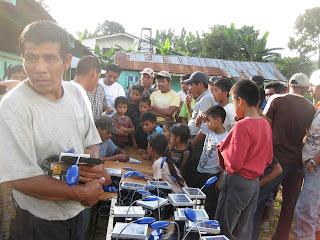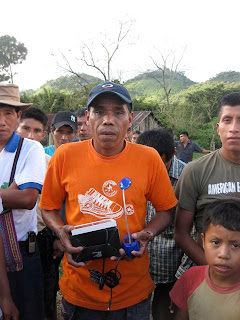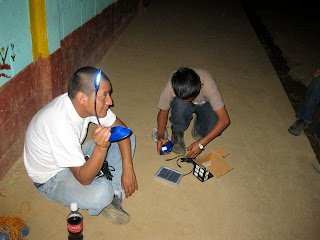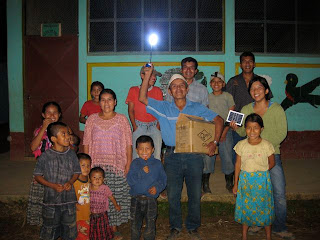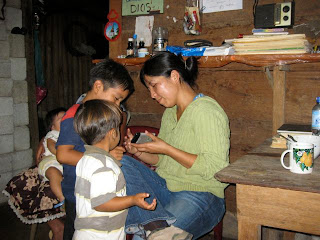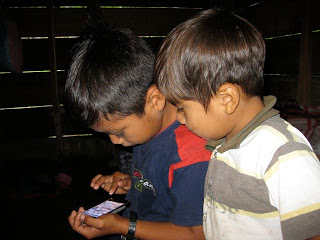It's been forever since I've written. I had expected the California period to be a short transient period to find a solar gig, then it lasted 9 months.
I'm currently in Bangalore, India to work with SELCO India. They're one of the leading distribution networks of off grid solar systems. They work hard to understand client needs and install full systems: solar panel, battery and either LED lighting or CFL lights. That's a standard package, but they modify their packages based on what the client needs and what he can afford to pay. The males are the heads of household here and make those purchasing decisions, so I'm not bad to forget the "he/she"use of pronouns. In addition to learning about their work in solar, I wanted to come here to support their SELCO labs where they focus on understanding needs of the rural community and eventually develop product for those needs. It sounded like Stanford's Extreme class, but I get the benefit of being in the rural area so we can validate prototypes, usage assumptions by being able to talk to people in the community.
I've been here for one week now. Originally the idea was that I would stay in Bangalore for three days and then head out to Ujire right away. All my packing is assuming that I'll be staying in a rural area for 3.5 months, not crazy congested city. Still, I am trying my best to be patient, and am trying to go with the flow. The person in charge of the Bangalore side of the labs has been trying to figure out what to do with me as well so we've been brainstorming ideas and I am looking for things I can take as an independent project.
This post won't jump into "all things SELCO" or "crazy stories about my first week in India". Rather, I want to take a step back and answer the question "why am I here in India?"
And bear with me, I ask this for myself. While I learn how to adjust to the craziness that is Bangalore, I wonder why I'm doing this. I am hoping that things will get better once I get out to Ujire because then I think I'll be in the environment I was seeking.
So back to the question.
I came here because I wanted to find a group that had real experience bringing solar to rural areas, so that I could learn from them.
In Guatemala, back in January, our team sold 800 of the 850 solar lanterns alloted to them in the first six weeks.
In the first week of February, Ricardo and I took a trip back to Rio Azul, the town where we built the 75 stoves, to deliver 100 lanterns. The requests for these lanterns through our regions exceeded the supply, but since we built stoves in Rio Azul, the leadership team allocated 100 lanterns to them provided that the people were really able to pay the ~$20 price. Pics are attached from this journey.
Thing is, this trip wasn't a slam dunk. Ricardo and I were so excited to go there with the lanterns because we knew how in a town with no electricity and no access to light that these lights would make a huge positive impact to their quality of life. We were excited we could meet their needs and help. Our meeting was scheduled for 4 pm, and since I knew the families would want to use their lights immediately that evening, but that the battery needed to be charged for four hours before use for best battery life, I told Ricardo we should unpack all the lights and charge them all. It was a pain to do, and technically not great to handle the product, but in my mind, servicing these products in the field when the fail is a challenge. The people were paying a lot of money to buy the lights, so at the minimum, I wanted them to have optimal battery life and teach them how to charge the lantern in the process.
Folks started to gather as we were unpacking the lanterns. They were curious and started to ask questions as we unpacked 100 lanterns. They would ask about the cell phone charging and we would try their cell phones with the different cell phone adapters provided by Barefoot Power. (Personal criticism I have is that Barefoot power fails to list which cell phones their adapters support). Good thing Guatemalans are flexible, but I had to grit my teeth each time I had to say in Spanish, "the solar panel can charge cell phones. It comes with 6 adapters. Oh, which ones? Well, we'll have to try yours out to see, but I know it charges certain Nokia and Motorola models" (I should know the answer, not BS an answer! Grr).
Ok, I digress.
After we finished unpacking the lights, it was time for the meeting. The townspeople who had signed up to buy the lights and folks who were curious gathered around Nicolas, our Rio Azul contact, and Ricardo who presented the light again before people paid for the products. The questions began, which Ricardo answered smoothly. Then the criticisms began -- "the light was too small" "the light was too expensive" "they thought the product would be bigger" "where was the larger solar panel?" "they didn't want to buy the light anymore". Essentially they were treating us as salespeople who were trying to peddle a bad product.
Ricardo and I were pretty shocked by the response, but he took a deep breath, and although frustrated, explained that if they didn't want to buy, it was fine. We were happy to take the 100 lanterns back to Nebaj since we had demand all throughout Guatemala. He explained that we were honoring our commitment to this town in trying to bring them light since we recognized the need was so great, but if folks did not want to buy them, it was fine.
Nicolas was concerned as well, but we finally decided we would just go through the list of 96 folks who had signed up for the lanterns. Each person could decide to buy the lantern or not. I can't remember the numbers, but ultimately, only 6-10 folks decided not to buy the lantern. Folks who did not sign up to buy the lights in advance used it as an opportunity to buy the lamps then. I was explaining the importance of charging their lanterns, so folks were sitting out in the fields charging their lights. That was exciting to see. I saw Alba again, the nice lady who Ana and I stayed with back in December. She heard we were going to stay in the school, so she told me we should stay at her house again. I was shocked since I had only met her the one time, but she was very genuine in her kindness and insistent, so I gratefully accepted.
I learned a lot through that experience.
1. The naysayers will have the loudest voice, even if they're in the minority.
2. The rural customers are savvier than you think and their expectations can go up significantly once they get exposed to technology. Case in point, folks were asking me when we could bring larger solar panels next time so they could charge light bulbs. For the record, this town had no light bulbs since there was no electricity, but they wanted to move to that point.
3. I shouldn't take the negative criticism personally. I was looking forward to this trip because I wanted this community to have light. After traveling around in December and living with families without electricity and light, I knew this product could help them, so I wanted to witness the impact first hand. I was completely taken by surprise when the negative vibe made me feel like an unwelcome charlatan. I had to work through that and think that ultimately the customer speaks if he/she chooses to make the purchase, and leave it at that.
By 6 pm, when dusk fell, we had five lanterns left so we packed up. As soon as the daylight faded, families came up to us to ask if we had any more lights. We sold the rest of the lights in 15 minutes and turned other families away. Our last customer was a young boy who was representing his family. After confirming we had lights, he asked us to hold one and ran back to his house to bring the money. so, the end result was good. We sold all the lights we had brought with us. We took a few pictures with Don Nicolas and his wife and some other people. Note the man holding the brown cardboard box that we had used to transport the lights to begin with. All the boxes proved to be popular and the different families requested them early as soon as they heard we didn't plan to take them with us.
Later that night when things wound down, we made it to Alba's house and I entertained her kids by showing them how to use my old iPhone (yay DVT4). I had a scribble application that kids like, and her boys picked it up really quickly. That UI impresses me every time I see kids play with it and pick it up so intuitively. As an aside, I was talking to Alba about her stove that they purchased back in November. Their family was actually building a kitchen attachment; it would be separate from the house and the stove was already there. Nothing grand, just wooden planks as walls and aluminum sheet as the roof. They were planning to use the stove once they finished their kitchen.
All in all, a good day. It was trying, but it all worked out.
That day was important to me because it's motivated me to answer the question - what are the other solar options? In what increments can we scale the panel offerings to provide an affordable, but useful product to these guys.
That's why I'm here in India. I think I can find the answers at SELCO. Once I learn more, I will share with the team in Guatemala. I also hope that solar will be interesting enough to me that I would want to work in the solar space in the future. Not sure, though. I'm not committing myself to anything at this point. I just want to learn. But, again, it's a tough lesson here in Bangalore. More on that another time.
(All the pics below are from the Guatemala trip.)





